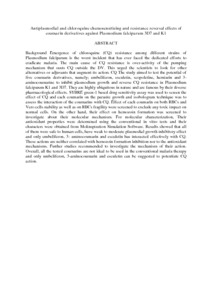Citation
O. Ibraheem, Zaid and Abd Majid, Roslaini and M. S., Hasidah and Md Noor, Sabariah and Rahi, Sattar and Basir, Rusliza
(2016)
Antiplasmodial and chloroquine chemosensitizing and resistance reversal effects of coumarin derivatives against Plasmodium falciparum 3D7 and K1.
Tropical Biomedicine, 33 (1).
pp. 14-26.
ISSN 0127-5720
Abstract
Background Emergence of chloroquine (CQ) resistance among different strains of Plasmodium falciparum is the worst incident that has ever faced the dedicated efforts to eradicate malaria. The main cause of CQ resistance is over-activity of the pumping mechanism that ousts CQ outside the DV. This urged the scientists to look for other alternatives or adjuvants that augment its action. CQ The study aimed to test the potential of five coumarin derivatives, namely; umbeliferon, esculetin, scopoletine, herniarin and 3-aminocoumarine to inhibit plasmodium growth and reverse CQ resistance in Plasmodium falciparum K1 and 3D7. They are highly ubiquitous in nature and are famous by their diverse pharmacological effects. SYBRE green-1 based drug sensitivity assay was used to screen the effect of CQ and each coumarin on the parasite growth and isobologram technique was to assess the interaction of the coumarins with CQ. Effect of each coumarin on both RBCs and Vero cells stability as well as on RBCs fragility were screened to exclude any toxic impact on normal cells. On the other hand, their effect on hemozoin formation was screened to investigate about their molecular mechanism. For molecular characterization, Their antioxidant properties were determined using the conventional in vitro tests and their characters were obtained from Molinspiration Simulation Software. Results showed that all of them were safe to human cells, have weak to moderate plasmodial growth inhibitory effect and only umbeliferon, 3- aminocoumarin and esculetin has interacted effectively with CQ. These actions are neither correlated with hemozoin formation inhibition nor to the antioxidant mechanisms. Further studies recommended to investigate the mechanism of their action. Overall, all the tested coumarins are not ideal to be used in the conventional malaria therapy and only umbeliferon, 3-aminocoumarin and esculetin can be suggested to potentiate CQ action.
Download File
![[img]](http://psasir.upm.edu.my/55095/1.hassmallThumbnailVersion/Antiplasmodial%20and%20chloroquine%20chemosensitizing%20and%20resistance%20reversal%20effects%20of%20coumarin%20derivatives%20against%20Plasmodium%20falciparum%203D7%20and%20K1.pdf)  Preview |
|
PDF (Abstract)
Antiplasmodial and chloroquine chemosensitizing and resistance reversal effects of coumarin derivatives against Plasmodium falciparum 3D7 and K1.pdf
Download (6kB)
| Preview
|
|
Additional Metadata
Actions (login required)
 |
View Item |

